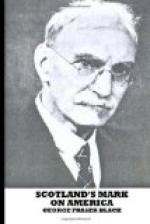Among the immigrants who flocked into Virginia in 1729 and 1740 we find individuals named Alexander Breckinridge, David Logan, Hugh Campbell, William Graham, James Waddell (the “Blind Preacher"), John McCue, Benjamin Erwin, Gideon Blackburn, Samuel Houston, Archibald Scott, Samuel Carrack, John Montgomery, George Baxter, William McPheeters, and Robert Poage (Page?), and others bearing the names of Bell, Trimble (Turnbull), Hay, Anderson, Patterson, Scott, Wilson, and Young. John McDowell and eight of his men were killed by Indians in 1742. Among the members of his company was his venerable father Ephraim McDowell. In 1763 the Indians attacked a peaceful settlement and carried off a number of captives. After traveling some distance and feeling safe from pursuit they demanded that their captives should sing for their entertainment, and it was a Scotswoman, Mrs. Gilmore, who struck up Rouse’s version of the one hundred and thirty-seventh psalm:
“By Babel’s streams
we sat and wept,
When Zion
we thought on,
In midst thereof we hanged
our harps
The willow
tree thereon.
“For there a song required
they,
Who did
us captive bring;
Our spoilers called for mirth,
and said:
‘A
song of Zion sing.’”
In the following year Colonel Henry Bouquet led a strong force against the Indians west of the Ohio, and compelled them to desist from their predatory warfare, and deliver up the captives they had taken. One of his companies was made up of men from the Central Valley of Virginia, largely composed of Scots or men of Ulster Scot descent, and commanded by Alexander McClanahan, a good Galloway surname. Ten years later occurred the battle of Point Pleasant when men of the same race under the command of Andrew Lewis defeated the Shawnee Indians.
In January 1775, the freeholders of Fincastle presented an address to the Continental Congress, declaring their purpose to resist the oppressive measures of the home government. Among the signers were William Christian, Rev. Charles Cummings, Arthur Campbell, William Campbell, William Edmundson, William Preston and others. Several other counties in the same state, inhabited mainly by Scots or people of Scottish descent, adopted like resolutions. During the Revolutionary war, in addition to large numbers of men of Scottish origin serving in the Continental army from this state, the militia were also constantly in service under the leadership of such men as Colonels Samuel McDowell, George Moffett, William Preston, John and William Bowyer, Samson Mathews, etc.




